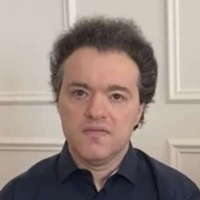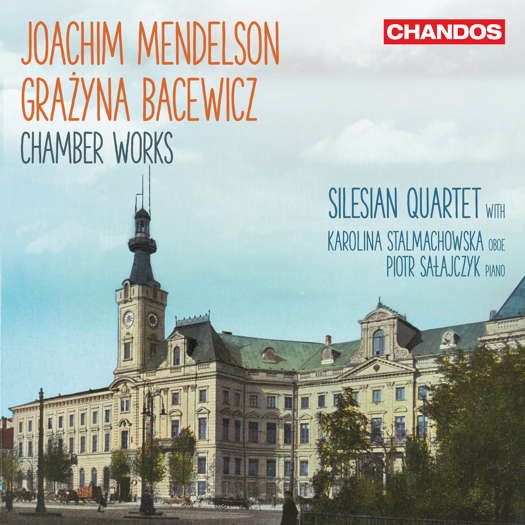 LISTENING TO TCHAIKOVSKY: Béla Hartmann uses his knowledge of Eastern Europe to argue against the banning of all Russian culture following Vladimir Putin's invasion of Ukraine.
LISTENING TO TCHAIKOVSKY: Béla Hartmann uses his knowledge of Eastern Europe to argue against the banning of all Russian culture following Vladimir Putin's invasion of Ukraine.
- Teatro Massimo
- Rondeau Production
- zither music
- Norwegian
- Isobel Beyer and Harvey Dagul
- Verdi: Oberto
- Franco Alfano
- Pacific Music Festival
 DISCUSSION: What is a work? John Dante Prevedini leads a discussion about The performing artist as co-creator, including contributions from Halida Dinova, Yekaterina Lebedeva, Béla Hartmann, David Arditti and Stephen Francis Vasta.
DISCUSSION: What is a work? John Dante Prevedini leads a discussion about The performing artist as co-creator, including contributions from Halida Dinova, Yekaterina Lebedeva, Béla Hartmann, David Arditti and Stephen Francis Vasta.

Quite Eclectic
Chamber music by Joachim Mendelson and Grażyna Bacewicz, heard by GEOFF PEARCE
'... insight, commitment and verve.'
This is an interesting CD. I had not heard of Joachim Mendelson (1897-1943) at all but Grażyna Bacewicz (1909-1969) is much better known, both to me and also the music going public as well. They are both Polish composers but Mendelson was to die tragically at the hands of a Gestapo officer whilst hiding in Warsaw. His music is not well known, and was to survive the war largely because of the efforts of his sister.
Joachim Mendelson's first String Quartet, dating from the early 1930s, was one of the few works that was performed at least once during his lifetime. It is in three movements. The first movement is overall happy in nature and dancelike, and the composer has obvious skill in writing for this combination. The work is well structured and coherent, and there are numerous changes of mood and speed over the course of just over five minutes.
Listen — Mendelson: Moderato con spirito ... (String Quartet No 1)
(CHAN 20181 track 1, 3:45-4:28) ℗ 2023 Chandos Records Ltd :
The second movement is slow and tender with an undercurrent of tension accentuated by shimmering repeated notes, but this gives way to a more relaxed accompaniment to the melodic line. There is a nice clarity to this movement and it is full of interesting textures and directions. At times it is quite whimsical.
Listen — Mendelson: Largo ... (String Quartet No 1)
(CHAN 20181 track 2, 2:35-3:12) ℗ 2023 Chandos Records Ltd :
The third movement is short, fast and dancelike, and reveals a composer who writes well with a lot of flair and creative energy. It is truly a delight and ends this quartet beatufully. It is a great pity he did not live longer and write more quartets. This deserves to be played frequently.
This work is followed by his Quintet for Violin, Viola Cello, Piano and Oboe and dates from 1939. Likewise this is in three movements and lasts just over thirteen minutes. It is not known whether this work was ever heard by the composer in his lifetime.
The first movement is a sparkling happy work, somewhat reminding me of some of the neoclassical composers. The pianist and oboist revel in the often virtuosic passages. I am particularly impressed with the oboist's facility and crisp articulation and pleasing sound.
Listen — Mendelson: Allegro ... (Quintet)
(CHAN 20181 track 4, 3:28-4:13) ℗ 2023 Chandos Records Ltd :
The second movement is slow and begins with a folk-like melody first heard on piano and cello, and then the oboe. It is serene, very listenable and charming.
The last movement often pairs instruments up and is quite Quixotic with rapid mood changes, and is generally lively, yet sometimes reflective in nature.
Next is an early work by Grażyna Bacewicz, a String Quartet written in 1929-30. It is only seven minutes long and in three short movements. The composer was a fine violinst and the skill she exhibits in her writing pays testament to this. She was also very self-critical, and neither this work nor her last quartet on this recording were published in her lifetime.
The first movement is engaging but is more intellectual than the Mendelson, written around the same time. The language is obviously more chromatic and complex, but not enough to alienate the more conservative listeners.
Listen — Bacewicz: Allegro moderato (String Quartet, 1929-30)
(CHAN 20181 track 7, 1:08-1:50) ℗ 2023 Chandos Records Ltd :
In the very brief slow movement, all four instruments are used equally, and the music is a kind of wistful lament.
The final movement is in the form of a fugue. The composer was interested in contrapuntal music, and in the works of Bach. It is a two subject fugue and is quite complex in nature but still enjoyable and the development is clear.
The String Quartet from about 1965 is typical of Bacewicz's later works in that it uses dense tonal clusters and a kind of germ cell development that characterises many of her later works. In four movements, it is substantially longer than the other pieces on this disc.
The first movement, much more forward-looking than the other works on this disc, is a fascinating juxtaposition of musical ideas and textures, yet is remarkably coherent and organised. There is a slower and more tranquil middle section before the more animated nature of the last section asserts itself.
Listen — Bacewicz: Allegro ... (String Quartet, circa 1965)
(CHAN 20181 track 10, 2:09-2:49) ℗ 2023 Chandos Records Ltd :
The second movement is slow and rather sorrowful, but elements of the first movement intrude and give different colour before the slow nature returns. Whilst the musical language is not always easy to listen to, there are strong tonal centres which keep the music grounded.
The third movement, marked Capriccioso, is full of humour and has some interesting changes in texture and direction that will keep the audience engaged and entertained. It is the most light-hearted of the movements.
Listen — Bacewicz: Capriccioso (String Quartet, circa 1965)
(CHAN 20181 track 12, 1:52-2:44) ℗ 2023 Chandos Records Ltd :
The final movement starts quite solemnly but this is not maintained for long. A dance-like rhythm emerges, but this does not last very long either. The musical ideals shift constantly and this is a rather restless movement of many contrasting emotions, sometimes intense and brooding, sometimes rather humorous and at other times more abstract.
This CD is quite eclectic. The two Mendelson works cannot but help make me wonder what might have been if he had lived longer and his circumstances had been different. The other composer Grażyna Bacewicz is much better known and highly regarded but still is not performed as often as her music would merit. I am very happy with the quality of the recording and the fantastic artists here. The pianist Piotr Sałajczyk and oboist Karolina Stalmachowska, who feature in the Mendelson work, are very fine and add a lot to that quintet. The backbone of this recording, the Silesian String Quartet, is a great ensemble who play with insight, commitment and verve.
Copyright © 29 May 2023
Geoff Pearce,
Sydney, Australia



